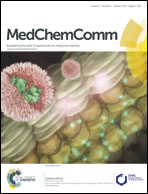Novel radioiodinated 1,3,4-oxadiazole derivatives with improved in vivo properties for SPECT imaging of β-amyloid plaques†
Abstract
We designed and synthesized a novel series of radioiodinated 3-(5-phenyl-1,3,4-oxadiazol-2-yl)pyridine (1,3,4-PODP) derivatives for imaging β-amyloid (Aβ) plaques in Alzheimer's disease (AD) brains using single photon emission computed tomography (SPECT). In binding experiments in vitro, 1,3,4-PODP derivatives (3 and 6) displayed high affinity for Aβ(1-42) aggregates (25 and 14 nM, respectively). In experiments in vivo, [123/125I]3 and [123/125I]6 displayed good initial uptake into and rapid washout from the brain in normal mice, and clearly labeled Aβ plaques in Tg2576 mice. Furthermore, specific labeling of Aβ plaques was observed in in vitro autoradiography of postmortem AD brain sections. These results suggested that 1,3,4-PODP derivatives may be useful SPECT probes for detecting Aβ plaques in AD brains.


 Please wait while we load your content...
Please wait while we load your content...